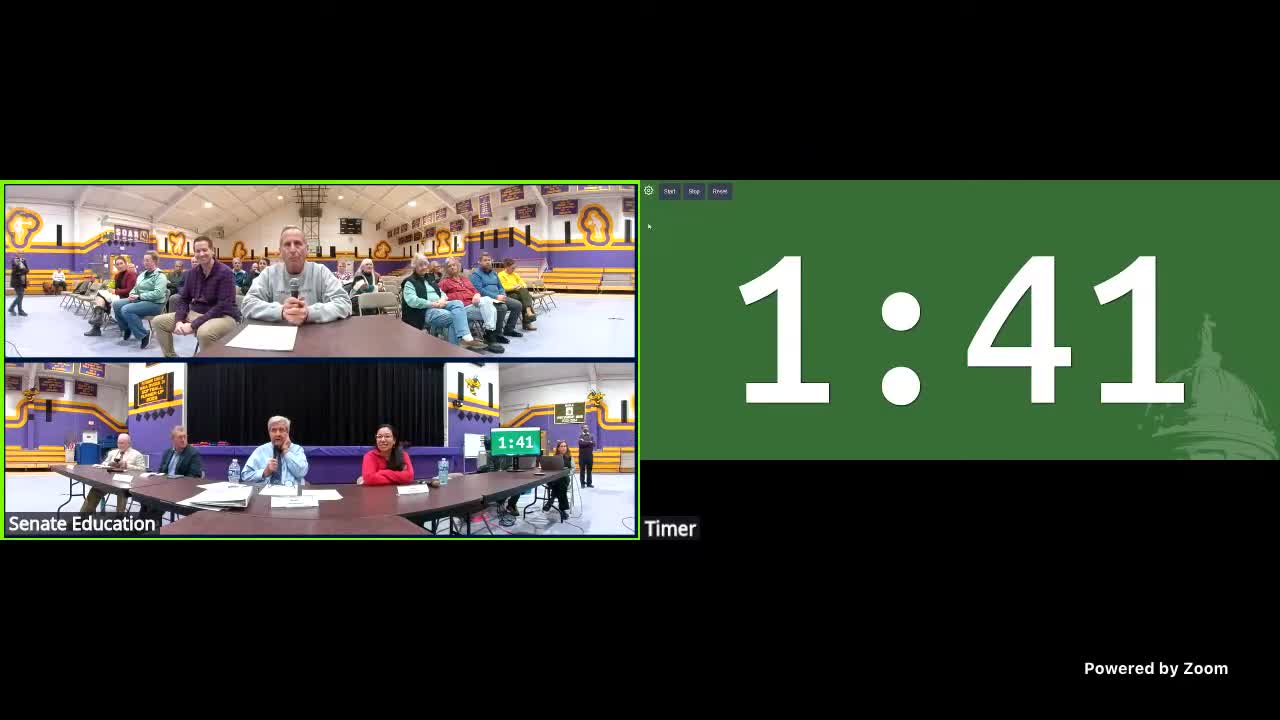Rural Vermonters Tell Senate Education Committee: Don’t Let Funding Changes Punish Small Schools
Get AI-powered insights, summaries, and transcripts
Subscribe
Summary
At a Canaan listening stop, the Senate Education Committee heard residents warn that the foundation formula and forced mergers proposed under Act 73 could erode small‑town programs, urging more technical assistance, targeted aid and support for career and technical education.
The Vermont Senate Education Committee visited Canaan on its listening tour to hear local concerns about Act 73, the proposed foundation funding formula and governance changes that residents say threaten small, rural schools.
Sen. Keisha Rockingham-Sale, a member of the Senate Education Committee, opened the session by praising students’ presentations and asking the community for frank feedback about what should be preserved in any funding or governance reforms. "You have something really beautiful here, and we certainly don't wanna harm that," she said as committee members invited public comment.
Why it matters: Residents and local board members told the committee that cuts to career and technical education (CTE) programs, sports and other extracurriculars often do not return once removed, triggering a ‘‘snowball’’ decline in enrollment and local revenue that hits sparsely populated towns especially hard. Multiple speakers urged the legislature to avoid top‑down, forced mergers and to focus state resources on targeted supports and technical assistance.
Parents and officials described concrete shortfalls and policy tensions. Martha Vanderwalk, a local board member, said the state counts her campus as one school even though it operates K–6 and 7–12 programs plus an attached CTE center, and warned that losing the small‑school weighting "would be half a million dollars" for her district and could exceed $1 million for some choice districts.
John Castle, a resident who said he has worked with several area school boards, urged the committee not to pursue forced mergers and suggested repurposing roughly $2,500,000 that has been allocated to the Agency of Education for consolidation assistance instead toward technical support and categorical aid. "I think those funds could be used elsewhere," Castle said, recommending targeted investments in community schools, mental‑health supports and capacity building in the AOE.
Several speakers raised the possibility of formal cooperation with nearby New Hampshire districts. A local committee member recounted multi‑year exploratory work on an interstate district, saying the effort stalled mainly because of differences in how New Hampshire and Vermont fund students, but that cross‑state sharing of courses and staff produced helpful synergies.
Chris Montoya, a parent and local engineer, pushed back on some numbers in a recent report, saying his district receives roughly $19,000 per student while the report cited $21,000, and urging more transparent, operational examples of how a foundation formula would work in rural settings.
What the committee heard about policy design: Committee members repeatedly signaled concern about minimum class‑size provisions and the governance mapping task force, which several attendees said could disproportionately affect very small schools that already run on tight budgets and fixed costs. Committee members said they would favor solutions that include technical assistance and careful implementation rather than blunt enforcement.
No formal votes or motions were taken at the Canaan stop; the meeting was explicitly a "listen and learn" session. Committee staff asked attendees to stay engaged and said members would follow up on questions about the foundation formula, small‑school weightings and potential supports for cross‑district resource sharing.
Next steps: The Senate Education Committee will continue its multi‑stop tour and said it will consider community feedback as it works through Act 73 revisions. Members encouraged residents to contact them and promised to investigate the specific funding and reporting discrepancies attendees raised.
